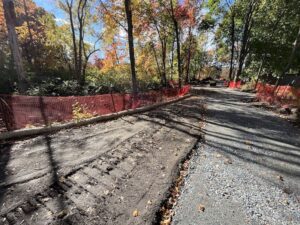Who is a member?
Our members are the local governments of Massachusetts and their elected and appointed leadership.

Reading has begun construction on a wetland water storage system in the Maillet, Sommes and Morgan conservation land. (Photo courtesy Horsley Witten Group)
In collaboration with regional partners, the town of Reading has embarked on a project to reduce the effects of precipitation-based flooding from the Aberjona River, a Mystic River tributary, by constructing a stormwater wetland storage system, essentially a series of storage pools.
The headwaters of the river begin in Reading and flow through multiple municipalities before draining into Boston Harbor. The waters pass through the Maillet, Sommes and Morgan conservation land in the town, where the system is being built.
Reading is using a $2.1 million Municipal Vulnerability Preparedness Action Grant to fund the project. (Reading received its MVP Community designation in 2020.) The project also received $75,000 from the Reading American Rescue Plan Act Committee and the Select Board. The project is expected to be completed next June.
“When this project was introduced, we looked at several sites, and this site was large enough, had the watershed, and had access to the river,” said Reading Conservation Administrator Charles Tirone. “The site chosen needed to receive water during rain storms to take out a certain amount of rainwater and keep it out of the storm system to help [mitigate] downstream flooding.”
The stormwater wetland storage system will capture stormwater in seven constructed pools, some as deep as 10 feet, in order to divert it from local roadways and culverts during high rain events and protect downstream communities. The system is designed to help alleviate flooding when storms drop up to 10 inches of precipitation in a single day.
The system will also help to filter pollutants and debris from the captured stormwater before it rejoins the river.
Tirone said “co-benefits” of the project include the removal of invasive species, improved water quality, improved ADA accessibility, and public access and improvement of the trail network.
The effort is part of a larger partnership with the Mystic River Watershed Association and Resilient Mystic Collaborative and the 20 other communities included in the watershed to address climate-related stormwater and flooding concerns.
Using a Municipal Vulnerability Preparedness Action Grant, Resilient Mystic Collaborative investigated 465 possible locations for stormwater storage, and the Reading site was deemed a top-three location, along with sites in Lexington and Woburn.
“We need to start looking forward and make our communities resilient in the face of a changing climate,” Tirone said. “With the flooding happening downstream in these communities, they are eager to get involved to address this issue.
“If a lot of communities do this then the storage capacity will be very helpful. We hope that this helps them.”